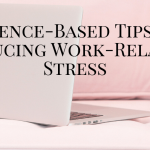 You may love your job or hate it, but one thing is certain. Your job can stress you out! Pole who are vulnerable to job stress may have particularly stressful jobs. This is particularly true for executives who are driven by deadlines, and deal with difficult people, or for those of us who have a high internal pressure to succeed.
You may love your job or hate it, but one thing is certain. Your job can stress you out! Pole who are vulnerable to job stress may have particularly stressful jobs. This is particularly true for executives who are driven by deadlines, and deal with difficult people, or for those of us who have a high internal pressure to succeed.
Here is a list of common work-related problems
- Too little time
- Too many responsibilities
- Multiple interruptions
- Excessive work loads
- Emotional distress (anger, frustration worry or fear)
- Conflicts with other people
- Uncertainty (not knowing what to do)
- Discrimination
- Lack of appreciation
So, if your job and hectic lifestyle seems to take its toll in your physical, emotional and psychological well-being, stress relief techniques can bring your life back into balance.
Now for the myth about corporate loyalty.
In the business world, most employers say they care about their employees. After all, people are their most important resource, so they’d better take care of them or they may lose them in the long run. But for many companies, dollars are far more important than people. When the chips are down, money will be conserved and people will be sacrificed. The reason why money is more important to these companies than you are is because you can be replaced. If you burn out, have a heart attack, or become disabled, someone else will take your place.
I don’t mean to imply that every company or all corporate leaders are insincere about their commitment to their employees well-being. Sometimes you will find a company that is truly committed to you and your welfare. I know because I work for one of those companies. But the truth is finding a company like that is pretty rare these days.
The lack of loyalty itself is not the major culprit. Rather it is our unconscious expectation that produce most of our stress and suffering.
So how do you deal with work stress? Dealing with stress is critical and the first critical piece of business is to ignore the myth and get down to work doing the best job you possibility can. Second, identify what areas of your work life are causing you the most stress. Get out a pen and piece of paper or your journal if you have one (I highly recommend you do keep a journal), and answer the following questions.
- This is how I feel about the people I work with
- This is how I feel about the environment in which I work
- This is how I feel about the values and purpose behind my employer
- This is how I feel about the actual day-to-day work I do
- My favorite thing about work is
- My least favorite thing about work is
- I wish my job could change in these ways.
How you manage the stressors at your job depends on what those stressors are. You can take different approaches:
- Avoid the stressor
- Eliminate the stressor (delegate or share a hated task)
- Confront the stressor (talk to y0ur supervisor)
- Manage the stressor (add something enjoyable to the task, give yourself a reward after completion)
- Balance the stressor (put up with the stress but practice stress-relieving techniques to balance out the effects)
- Take short breaks. In times when you’re mentally stressed, take a break to clear your mind. Stepping away from your desk briefly allows you to relax and recharge.
- Create an uplifting environment. Decorate your office with photos, plants to liven up your workspace, or items that can lift your spirits.
- Leave work at WORK. It’s important to distinguish your work life and living a life outside of work. Don’t burn yourself out by doing work after you get home at night.
Work is a big part of your life. And as an executive you have a lot of responsibilities and a great number of people depending on you to be at your best, acting in their best interest no matter what’s going on around you. If you can do something to avoid, eliminate, confront or balance the stress that comes from your work life, you entire life will be more balanced a less stressful.





Leave a Reply